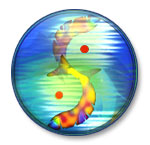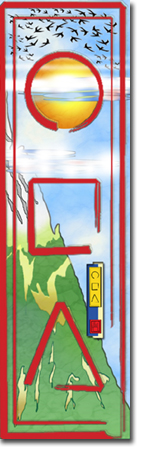On The Way: The Daily Zen Journal
Essential Teachings of the Stone Lion: Stages of Meditation
Kusan Sunim (1909-1983)
When people discuss the practice of meditation, they often refer to a person having either a superior, intermediate, or inferior capacity for this task. However, these capacities are not inborn qualities. For once a strong motivation has been generated, then a person is immediately endowed with a superior quality.
Nevertheless, there are different levels of motivation. Some people may leave the care of their parents and relatives and become monks or nuns with the sincere motivation to realize Buddhahood. But after practicing for while they discover that the aim of meditation is not achieved as easily as cooling hot porridge by pouring cold water on it.
Such persons may become disheartened when their practice does not proceed as smoothly as they had expected. However, a person of superior capacity is able to completely cut off the mind of discrimination as soon as he is told to do so. But for those who are unable to do this, much hardship, effort, and total determination are needed before they can achieve this state.
Your practice should always be guided by wisdom. An ancient master once said, “A wise meditator is like a cook who skillfully prepares rice for food, while a foolish meditator is like a cook who prepares sand to eat.” Now, would you ever succeed in making rice by cooking grains of sand? So let us consider how to pursue our practice in a wise manner.
Most people who meditate on a hwadu (koan) intend at the outset to keep a firm hold on it. But, usually, after a very short while, their hwadu disappears, and they just lose themselves in delusive thoughts. If someone persists with such a practice, when will he ever awaken?
Others, after a few initial attempts to hold on to the hwadu, find that it does not appear to them spontaneously. So they just sit still without doing anything at all. Such people then ask me, “What do you claim there to be? Surely there is just nothing.”
The problem here is that although they tried to hold on to the hwadu, they found nothing that they could take firm hold of. Thus they conclude that there is nothing at all. But such conclusions are only reached intellectually. Indeed, as long as you continue just to scheme and conceptualize with the intellect, you will find nothing to take firm hold of. But to then proclaim that in reality there is just nothing is mere foolishness.
When the Buddha, after practicing in hills and forests for six years, finally saw a bright star and thereupon awakened, his awakening was not merely due to seeing the star. In fact it was due to his beholding a far greater brilliance.
When the ancient masters gave a single word answer to the questions of their disciples, they always had a definite reason for doing so. And when Bodhidharma talked of pointing directly to the mind, seeing into his original nature and thereby realizing Buddhahood, he also had a good reason for doing so.
If there was in reality just nothingness, why would they have said such things? It was not just for the sake of saying something. The Buddha as well as the ancient masters and Bodhidharma all had definite reasons for saying what  they did.
they did.
So when an inexperienced meditator declares, “Since there is just nothing, then what are you looking for?” he is speaking meaninglessly. Moreover, such words slander the Buddhas and patriarchs through contradicting what they said.
It is essential to take a firm hold of the hwadu and to continuously advance in your practice. This is the same whether you are investigating “What is this?” “No!” or “the cypress in the courtyard.”
Initially you do not understand at all what is meant by these questions. Therefore, in order to fully understand their meaning, you must seize hold of the hwadu and penetrate deeply into it with incessant questioning.
It is really very simple: you do not understand what is meant, thus it is necessary to find out through constant questioning. If you did understand, then, of course, there would be no need for any such questioning.
The greatest disease that can affect someone who is meditating on a hwadu is the absence of any questioning. It is quite meaningless to simply repeat the hwadu mechanically in your mind without this sense of questioning.
When you first try to meditate, you may find that no matter how strong your resolve is to firmly hold the hwadu, the mind is constantly besieged by wandering thoughts, and it seems impossible to progress in the practice. So what should be done to correct this problem?
At such times you must completely forget about what has happened in the past. For what benefit is there in continuing to think about things that have already ceased? Likewise, you should desist from speculating about what might happen in the future. For since it will be determined by various conditions, what can your present thoughts do to influence the course of future events? Your sole function during a meditation session is to sit on the meditation cushion, investigate your hwadu, and awaken to its meaning.
Other than this there is nothing to do. So why do you needlessly waste this precious time by entertaining thoughts about what has been and what might be? However, as soon as you manage to cut off all thoughts of the past and future you will experience a state of emptiness.
This occurs because at that moment both before and after are severed. If you cannot reach this state because of an inability to control your thoughts about the past and future, then you cannot be considered a true practitioner. Remember: your sole responsibility is to awaken through inquiring into the hwadu.
Kusan Sunim (1909-1983)
Excerpted from The Way of Korean Zen Kusan Sunim and Martine Batchelor 2009




Fall and Spring are both potent times to evaluate our practice; without judgment, just look to see if there are any adjustments to be made. Is your practice fresh? Have you become an old hand at practice? Many people start off so excited and have tremendous energy for meditation, beginner’s mind we call it. How to keep a practice real over years is akin to a life koan, relevant to anyone who stays with meditation. Whether you practice a form of meditation that utilizes koan or hwadu as a focal point or just sit watching the breath, the points brought out in the above piece speak clearly to us.
If you haven’t explored what brought you to practice in a while, now might be a good time to look at what’s driving your practice. As the leaves turn color, the flowers come into bloom, both evidence of time passing, they bring messages to wake up. There is never as much time left as we think. And none of us want to continue sleep walking or fooling ourselves; even within meditation practice this can happen….
With Care,
Elana